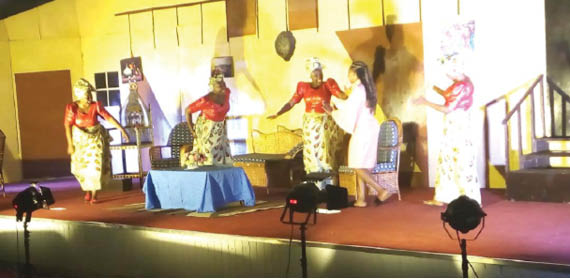When U.S. Embassy celebrated Black History Month
The Black History Month celebrated annually to mark African Americans’ contribution to the United States and the world was commemorated with a stage performance titled ‘The Homecoming Queen’ by Ngozi Anyawu’s. The first-ever performance, which took place at National Universities Commission (NUC) auditorium, was organized by United States Embassy, Abuja in collaboration with Department of […]

A scene from the stage play at NUC Auditorium, Abuja
The Black History Month celebrated annually to mark African Americans’ contribution to the United States and the world was commemorated with a stage performance titled ‘The Homecoming Queen’ by Ngozi Anyawu’s.
The first-ever performance, which took place at National Universities Commission (NUC) auditorium, was organized by United States Embassy, Abuja in collaboration with Department of Theatre and Performing Arts, Ahmadu Bello University, Zaria.
The play tells the story of Nigerian-born Kelechi who returns to her village in Nigeria after spending 15 years in America. It focuses on Africans in diaspora and how they deal with trauma while trying to make a living. It was a thought-provoking interrogation of the concept of home, posing the question: “is home a birthplace or is birthplace a home?”
Black History Month is commemorated annually in the U.S. in February to celebrate the creativity, ingenuity, cultural and political experience of Americans of African descent. Events include lectures, exhibitions, banquets and other cultural activities.
In his remark, Country Public Affairs Officer, U.S Embassy, Aruna Amir Thanayagam who represented the U.S. Ambassador to Nigeria, Mary Beth Leonard, said the event is part of the Embassy’s larger celebration of the Black History Month.
“Through films, public lecture and now live theatre, we honor the incredible contributions African Americans have made to the United States and the world. These achievements in the arts, sciences, economics and many other fields demonstrate the resolve, resilience and courage of African Americans against historical backdrop of discrimination and bigotry.”
